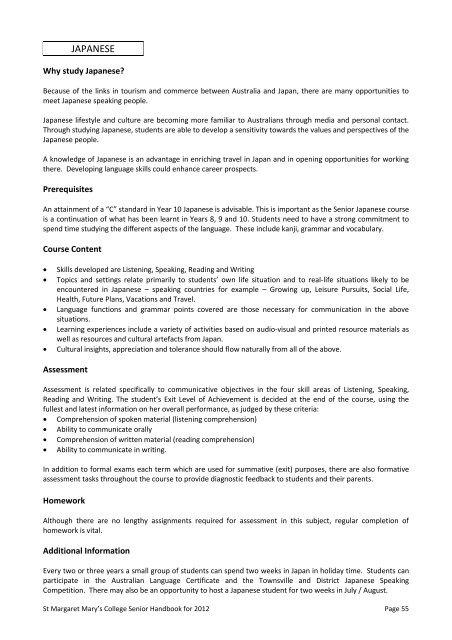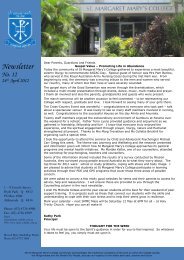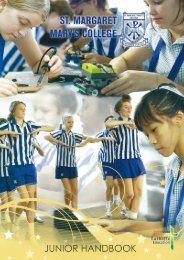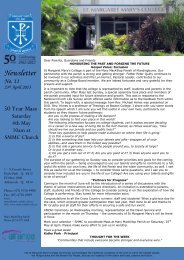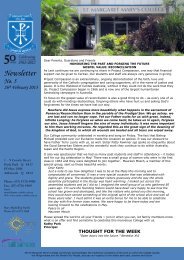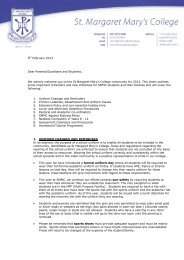SENIOR HANDBOOK for 2012
PRINCIPAL'S MESSAGE - St Margaret Mary's College
PRINCIPAL'S MESSAGE - St Margaret Mary's College
- No tags were found...
You also want an ePaper? Increase the reach of your titles
YUMPU automatically turns print PDFs into web optimized ePapers that Google loves.
JAPANESE<br />
Why study Japanese?<br />
Because of the links in tourism and commerce between Australia and Japan, there are many opportunities to<br />
meet Japanese speaking people.<br />
Japanese lifestyle and culture are becoming more familiar to Australians through media and personal contact.<br />
Through studying Japanese, students are able to develop a sensitivity towards the values and perspectives of the<br />
Japanese people.<br />
A knowledge of Japanese is an advantage in enriching travel in Japan and in opening opportunities <strong>for</strong> working<br />
there. Developing language skills could enhance career prospects.<br />
Prerequisites<br />
An attainment of a “C” standard in Year 10 Japanese is advisable. This is important as the Senior Japanese course<br />
is a continuation of what has been learnt in Years 8, 9 and 10. Students need to have a strong commitment to<br />
spend time studying the different aspects of the language. These include kanji, grammar and vocabulary.<br />
Course Content<br />
<br />
<br />
<br />
<br />
<br />
Skills developed are Listening, Speaking, Reading and Writing<br />
Topics and settings relate primarily to students’ own life situation and to real-life situations likely to be<br />
encountered in Japanese – speaking countries <strong>for</strong> example – Growing up, Leisure Pursuits, Social Life,<br />
Health, Future Plans, Vacations and Travel.<br />
Language functions and grammar points covered are those necessary <strong>for</strong> communication in the above<br />
situations.<br />
Learning experiences include a variety of activities based on audio-visual and printed resource materials as<br />
well as resources and cultural artefacts from Japan.<br />
Cultural insights, appreciation and tolerance should flow naturally from all of the above.<br />
Assessment<br />
Assessment is related specifically to communicative objectives in the four skill areas of Listening, Speaking,<br />
Reading and Writing. The student’s Exit Level of Achievement is decided at the end of the course, using the<br />
fullest and latest in<strong>for</strong>mation on her overall per<strong>for</strong>mance, as judged by these criteria:<br />
Comprehension of spoken material (listening comprehension)<br />
Ability to communicate orally<br />
Comprehension of written material (reading comprehension)<br />
Ability to communicate in writing.<br />
In addition to <strong>for</strong>mal exams each term which are used <strong>for</strong> summative (exit) purposes, there are also <strong>for</strong>mative<br />
assessment tasks throughout the course to provide diagnostic feedback to students and their parents.<br />
Homework<br />
Although there are no lengthy assignments required <strong>for</strong> assessment in this subject, regular completion of<br />
homework is vital.<br />
Additional In<strong>for</strong>mation<br />
Every two or three years a small group of students can spend two weeks in Japan in holiday time. Students can<br />
participate in the Australian Language Certificate and the Townsville and District Japanese Speaking<br />
Competition. There may also be an opportunity to host a Japanese student <strong>for</strong> two weeks in July / August.<br />
St Margaret Mary’s College Senior Handbook <strong>for</strong> <strong>2012</strong> Page 55


